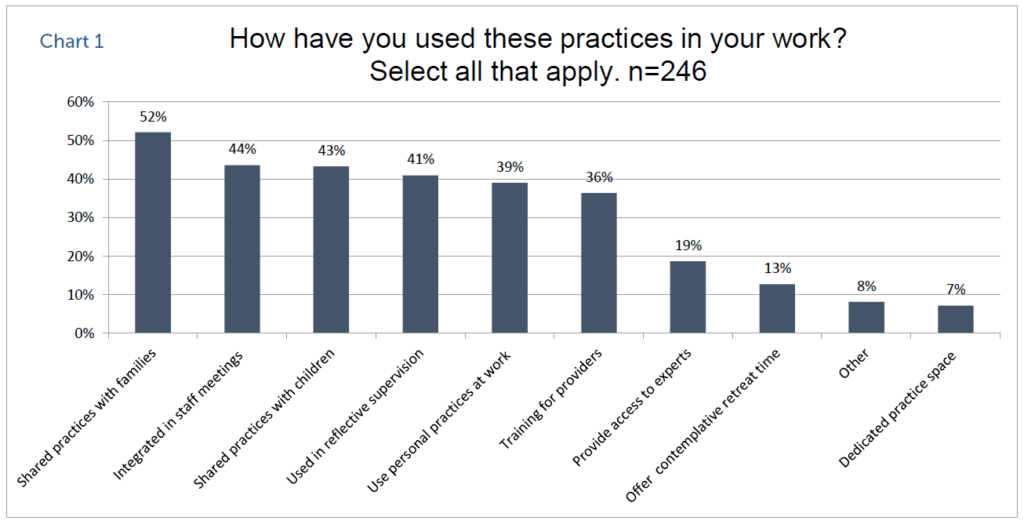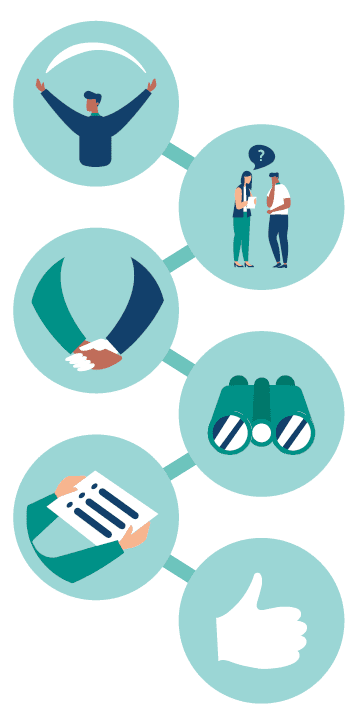Getting Started with Mindfulness: A Toolkit for Early Childhood Organizations

What is mindfulness?
Learn more about the case for implementing mindfulness in early childhood, try hands-on strategies for doing so, and learn more from organizations that have begun this journey.
In this resource, mindfulness is thought of as intentional and non-judgmental present-moment awareness. This kind of awareness means we are purposefully paying attention to what is happening around us, what is happening inside us, what we are doing, and how we are doing and feeling without judging or analyzing. This ability to focus attention on the present and to maintain that focus is a foundational skill that underlies many other important capacities that we need for health, well-being, and connection with children, families, and others.
Mindfulness is simply being aware of what is happening right now without wishing it were different; enjoying the pleasant without holding on when it changes (which it will); being with the unpleasant without fearing it will always be this way (which it won’t).
James Baraz
Mindfulness in the Early Childhood Environment
When adults engage in focusing practices like mindfulness in early childhood settings, it helps to build important mental, social, and emotional skills that they need to be responsive supports and effective models.
We often hear about the important role that a calm and responsive adult, and secure adult-child relationship, plays in helping young children learn and grow. We know that these relationships develop through attuned and sensitive care and interactions. What can early education professionals do to offer children consistent, nurturing care and responsiveness? How can we build our capacity to stay focused and attentive to all children and families in our care? What helps us notice and respond sensitively to a child’s needs and emotions (while we are experiencing strong feelings too)?
These are common challenges that arise in caring for children. Similar challenges arise when providing support to parents and professionals working with children. Through the work of scientists, psychologists, and child development specialists, we are discovering some answers to these questions and how practicing mindfulness in early childhood settings might help.

Mindfulness is always part of our LEARN Conference. Join us at our next event.
Four Capacities Enhanced by Mindfulness
There are four distinct and related capacities that are critical in the early childhood workplace: attentional awareness, emotional regulation, perspective-taking, and self-compassion. All can be enhanced by mindfulness.
- Mindfulness training supports attentional awareness by helping us engage with important details, stay with present experience, and disengage with distracting information.
- There is growing evidence that mindfulness training improves emotional regulation skills (Baer et al 2009; Carmody et al 2009). Emotional regulation skills allow us to better model and scaffold a state of calmness, particularly in times of distress for children, families, and co-workers.
- Mindfulness can be used to expand our capacity for perspective-taking as we better understand our own emotions, intentions, and beliefs, we see others’ more clearly as well.
- Self-compassion helps us shift from a stance of self-criticism and judgment to one of self-care, warmth and love. Rather than judge ourselves harshly, we can acknowledge our feelings in the moment (shame, frustration, anger, disappointment, etc.) and recognize that these moments are part of the shared human experience. Doing so can increase our capacity for resilience during moments of conflict, frustration, or upset.
Mindfulness Application
Steps for practical application and implementation in your organization.
1. Start with yourself
Develop an authentic experience with mindfulness and share from that experience.
2. Assess interest
Ask questions to explore and discover what is already happening in your organization.
3. Internal champions
Seek others to help you move the effort forward and share responsibility for success.
4. Create collective intentions
Identify and connect to existing organizational values.
5. Implement your action plan
Build on and extend current structures and practices of your team.
6. Adapt your plan!
Make sure to acknowledge progress and learning as you continue to deepen your practices.
Download the free, full toolkit for early childhood professionals by filling out the form above.

See our full suite of mindfulness resources for parents and professionals.


